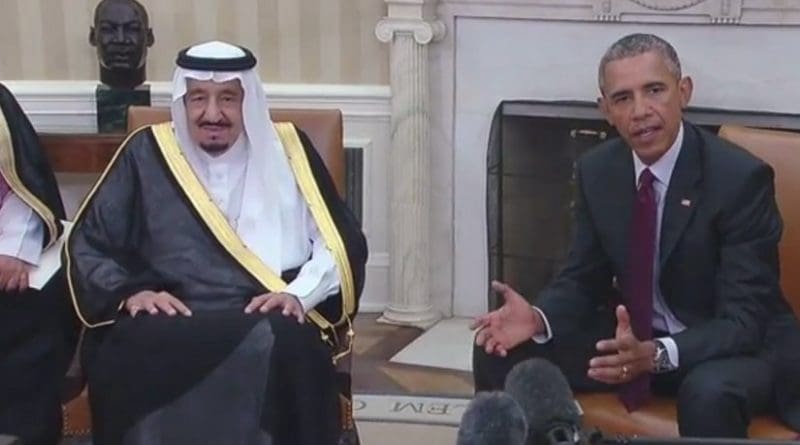Has US Changed Its Policy After King Salman’s Visit? – OpEd
By Arab News
By Mohammed Fahad Al-Harthi
The much-heralded visit to Washington by Custodian of the Two Holy Mosques King Salman exceeded all expectations by seeing the old allies reach consensus on vital regional and international matters. After their critical summit, King Salman and President Barack Obama both expressed the desire to further develop the two nations’ long-term strategic partnership, signaling a qualitative change in the 70-year relationship.
Saudi Arabia’s latest diplomatic modus operandi has focused on building sound economic partnerships in the belief this will result in mutually beneficial political ties. This approach has seen the king heading to Washington, and earlier Deputy Crown Prince Mohammed bin Salman visiting Russia and France.
The result has been a massive $2 trillion worth of investment opportunities earmarked in 12 sectors, including infrastructure, transportation, mining, finance, housing, health, education, banking and entertainment. The Saudi government has correctly placed the interests of its citizens first by taking this route, but has also catalyzed a network of interlocking relations with some of the world’s most influential countries.
The United States, a global superpower, considers Saudi Arabia an important player with which it has a special alliance. Washington needs Riyadh in the volatile Middle East, as a politically moderate state that enjoys international respect and confidence.
This country is not only a regional and global economic powerhouse, but also the spiritual home for over a billion people because it hosts Islam’s holiest sites. It is therefore in the interests of both countries to have solid agreement on important issues.
Some analysts have argued that Washington has been moving closer to Iran, effectively replacing Saudi Arabia. But this argument is clearly not logical or realistic.
During a visit to the Middle East Institute in Washington while King Salman was in the capital, former White House advisers and retired ambassadors told Saudi editors that the United States has more reasons to keep its distance from Iran rather than cozy up to it.
They explained that Washington sought the nuclear deal to ensure that Iran does not acquire nuclear weapons, and was not meant to completely change its relationship with Tehran.
The Americans know that the region’s problems can be traced to one common denominator, which is clearly Iran. They reiterated that the Iranians would not have a green light to do as they like. A top Saudi official said that the Kingdom told Washington it would not brook any interference by Iran in the internal affairs of Arab countries.
Analysts say that this has been demonstrated by Saudi Arabia leading a rare military alliance of Arab nations to counter Tehran’s violations of international law in Yemen by starting a proxy war with its support of local militant groups.
It is clear that Washington and Riyadh want a strategic partnership on all levels. King Salman has stated unequivocally that this is needed to ensure world peace and stability; and emphasized again that Saudi Arabia has no expansionist plans.
The two countries have now overcome the nuclear weapon issue, which Saudi Arabia has approved on the condition that there is strict and permanent monitoring, and the use of sanctions if Iran violates the agreement. While Washington is known for its drawn out decision-making because of bureaucratic hurdles, the general atmosphere on Capitol Hill is that close ties are absolutely essential between the two nations.
The Saudi ambassador in the United States, Prince Abdullah bin Faisal, is well-respected and his presence as part of King Salman’s delegation has opened important doors in Washington.
The two countries are now looking beyond the Iranian nuclear deal and have set in place a firm foundation on which their strategic relationship will be based. King Salman has undoubtedly stamped the country’s new foreign policy direction on the agreement, which will protect the country’s interests over the long haul.

